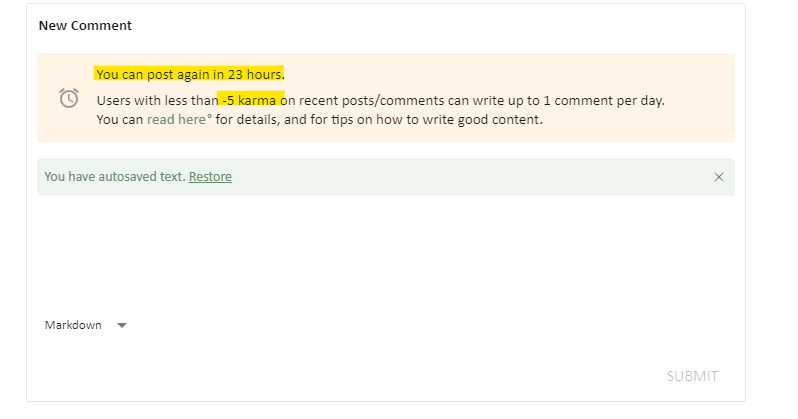Just a short post to highlight an issue with debate on LW; I have recently been involved with some interest in the debate on covid-19 origins on here. User viking_math posted a response which I was keen to respond to, but it is not possible for me to respond to that debate (or any) because the LW site has rate-limited me to one comment per 24 hours because my recent comments are on -5 karma or less.
So, I feel that I should highlight that one side of the debate (my side) is simply not going to be here. I can't prosecute a debate like this.
This is funnily enough an example of brute-force manufactured consensus - there will be a debate, people will make points on their side and the side I am arguing for will be missing, so observers will conclude that there are no valid counterarguments rather than that there are, but they were censored.
I think this is actually quite a good model of how the world has reached the wrong conclusion about various things (which may include covid-19 origins, assuming that covid-19 was actually a lab leak which is not certain). This is perhaps even more interesting than whether covid-19 came from a lab or not - we already knew before 2019 that bioerror was a serious risk. But I feel that we underestimate just how powerful multiple synergistic brute-force consensus mechanisms are at generating an information cascade into the incorrect conclusion.
I'm sure these automated systems were constructed with good intentions, but they do constitute a type of information cascade mechanism - people choose to downvote, so you cannot reply, so it looks like you have no arguments, so people choose to downvote more, etc.

Yea, that's what I tried to say. If you want to have a debate better than 4chan, but also feel bad whenever someone accuses you of censorship, you need to think about it and find a solution you would be satisfied with (while accepting that it may be imperfect), considering both sides of the risk.
Disabling the voting system or giving someone dozen "balancing" upvotes whenever they accuse you of censorship / manipulation / hive mind, that only incentivizes people to keep accusing you of censorship / manipulation / hive mind. And maybe I am overreacting, but I think I already see a pattern:
We have a long history of content critical of Less Wrong getting highly upvoted on Less Wrong. Which alone is a good thing -- if that criticism makes sense, and if the readers understand the paradoxes involved (such as: more tolerant groups will often get accused of intolerance more frequently, simply because they do not suppress such speech). Famously, Holden Karnofsky's criticism of Singularity Institute (previous name of Yudkowsky's organization) was among the top upvoted articles in 2012. And that was a good thing, because it allowed a honest and friendly debate between both sides.
But recently it seems to me that this is devolving into people upvoting cheap criticism, which seems optimized to exploit this pattern. Instead of writing a well-reasoned article whose central idea disagrees with the current LW consensus and letting the readers appreciate the nuances of the fact that such article was posted on LW, the posts are lower-effort and directly include some form of "if you disagree with me, that only proves my point". And... it works.
I would like to see less of this.